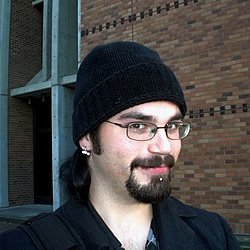Undergraduate
Student Leaders "Pay It Forward"
Greg Smith smiles as he thinks about the weekly class he leads for first quarter transfer students planning to major in psychology. "The best part of peer teaching is connecting with the students and being able to share accumulated knowledge and experience that can't be found in textbooks," he says. "It's about paying it forward ." Both Greg and fellow psychology senior Adrian Garcia are experiencing the satisfaction--and the challenges--of temporarily swapping the student role for that of the teacher.
 Greg leads a Transfer and Returning Student Interest Group (TRIG), while
Adrian leads a freshman seminar called an Academic Learning Lab
(ALL). The UW TRIG program brings first quarter transfer and
returning students together in weekly peer-facilitated sessions that are
bundled with academic classes (Greg's students are taking Biopsychology
and Fundamentals of Psychological Research). Adrian's ALL is part
of a pilot project conceived of by academic advisers and run out of the
College of Arts and Sciences Dean's Office. ALLs are freshman
seminars attached to clusters of social sciences or arts classes.
The primary goal of the project is to give first quarter freshmen an in
depth introduction to the arts or the social sciences--teaching them
about disciplinarity by having them hear faculty and students talk about
their work, and by making connections between courses in the
clusters. "The idea of being part of a program that is trying to
provide freshmen with a cohesive academic focus during their first
quarter at UW was very exciting to me," says Adrian of his motivation
for leading the ALL. "And, it's been a fun growing experience for
me," he adds, "it's really gotten me out of my comfort zone!"
Greg leads a Transfer and Returning Student Interest Group (TRIG), while
Adrian leads a freshman seminar called an Academic Learning Lab
(ALL). The UW TRIG program brings first quarter transfer and
returning students together in weekly peer-facilitated sessions that are
bundled with academic classes (Greg's students are taking Biopsychology
and Fundamentals of Psychological Research). Adrian's ALL is part
of a pilot project conceived of by academic advisers and run out of the
College of Arts and Sciences Dean's Office. ALLs are freshman
seminars attached to clusters of social sciences or arts classes.
The primary goal of the project is to give first quarter freshmen an in
depth introduction to the arts or the social sciences--teaching them
about disciplinarity by having them hear faculty and students talk about
their work, and by making connections between courses in the
clusters. "The idea of being part of a program that is trying to
provide freshmen with a cohesive academic focus during their first
quarter at UW was very exciting to me," says Adrian of his motivation
for leading the ALL. "And, it's been a fun growing experience for
me," he adds, "it's really gotten me out of my comfort zone!"
 Adrian's first step out of that comfort zone came when he transferred to
UW from Columbia Basin Community College, leaving his hometown of
Prosser, Washington, for the big city. A bachelor of arts student
in psychology with an art history minor, Adrian hopes to move on to
Antioch University's art therapy program. Adrian credits his UW
education not only with the breadth and depth of academic knowledge
gained, but with helping him to progress on a path of personal
development. Reflecting on the benefits gained from a recent class
on human performance enhancement, Adrian explains that "it was amazing
to take all of the theoretical aspects of psychology that I had learned
in previous classes and be able to apply them to myself in the form of
self discovery and growth."
Adrian's first step out of that comfort zone came when he transferred to
UW from Columbia Basin Community College, leaving his hometown of
Prosser, Washington, for the big city. A bachelor of arts student
in psychology with an art history minor, Adrian hopes to move on to
Antioch University's art therapy program. Adrian credits his UW
education not only with the breadth and depth of academic knowledge
gained, but with helping him to progress on a path of personal
development. Reflecting on the benefits gained from a recent class
on human performance enhancement, Adrian explains that "it was amazing
to take all of the theoretical aspects of psychology that I had learned
in previous classes and be able to apply them to myself in the form of
self discovery and growth."
Having already made one big transition from his hometown of Anchorage, Alaska, to the University of Texas at Arlington, Greg came to UW seeking a very specific kind of education. "I wanted a psychology degree with the kind of scientific research base that is here at UW," Greg remembers. "The research focus that I sought is interwoven into every class here." Greg points to the blending of UW Psychology's emphasis on research and the scientific method with what he calls the more "humanistic," or applied focus of UT Arlington, noting that this combination will undoubtedly make him a stronger candidate for graduate programs.
Now a year into their studies, these two friends and alums of the autumn 2008 psychology TRIG class reminisce about their first quarter on campus and consider what it means to each of them to help lay a strong foundation for new UW students. "I like being part of the evolution of this new first quarter seminar," says Adrian of his work with the social science ALL, "brainstorming from week to week with fellow student leaders, faculty and advisers." No doubt familiar to any educator is Greg's characterization of his TRIG class, equal parts enthusiasm and frustration: "There isn't enough time. Period. The class becomes this wonderful academic and social snowball, bringing up all kinds of questions and discussions."
As that snowball picks up speed, heading toward the end of the quarter, it will likely result in a new cohort of psychology majors who are ready to move forward with the momentum gained during an exciting first quarter. Many will be ready to dive into the opportunities that just several weeks ago may have been unknown to them: research, community-based fieldwork, study abroad, and--perhaps--peer teaching. Learning. Growing. And... paying it forward .
Undergraduate Accomplishments
Psychology Honors Program
In May, 15 psychology honors students presented their research to faculty, staff, and their peers in a poster session. Take a look at the poster session program to learn more about the students and their work.
Tim Harris , a double major in psychology and international studies, received a Mary Gates Leadership award . Tim was also a finalist for the Bonderman Travel Fellowship .
McNair Scholars
The Ronald E. McNair Program prepares undergraduates for doctoral study through involvement in research and scholarly activities. The 2008-09 McNair Scholars from Psychology are:
- Safia Farole
- Albert Han
- Kiara Roberts
Michael Murphy , who graduated Magna Cum Laude in June, was a finalist for the Arts & Sciences Dean's Medal in the natural sciences .
 Mary Gates Research Scholars
Mary Gates Research Scholars
These students were 2008-09 recipients of Research awards from the
Mary Gates
Endowment
:
- Sergey Karayev
- Jessica Kang
- Kuzma Kovzum
- Susan McKay
- Amy Moretti
- Joshua Newsome
- Cortney Taylor
- Amanda Tose
Jessica Kang also received an Undergraduate Diversity Travel Award from the Society for Personality and Social Psychology to support her attendance at the society's annual meeting in Tampa.
The following undergraduate psychology majors were invited to join Phi Beta Kappa . Invitation is based upon the students' excellent academic record and interest in the liberal arts. The students are:
- Dylan Antovich
- Candis Bergerson
- Lauren Bond
- Michelle Chan
- Nara Chin
- Anne Collins
- Fabrienne Doll
- Robert Fox
- Jeffrey Girard
- Erin Harrop
- Kathryn Howell
- Joy Kawamura
- Svenja Kempin
- Victor Nguyen
- Irina Nikolayev
- Canada Parrish
- Jennifer Pohl
- Rika Reid
- Emily Safrin
- Victoria Schmidt
- Alyssa Takatsuki
- Sterling Thomason
- Amanda Tose
- Jessica Vargas
- Martina Wong
- Kai Chi Yam
Guthrie Prize
The Guthrie Prize is a high honor for any undergraduate student. Entries may be either an empirical paper, a conceptual paper, a literature review, or a research proposal. The prize was established to encourage excellent writing about psychology that was broad in scope and accessible to the non-specialist.
Best Empirical Paper: Alix B. W. Norton
Encoding of Taste Novelty by Midbrain Neurons
Sponsored by Sheri Mizumori, Ph.D.
Best Review/Conceptual Paper: Joy S. Kawamura
Parenting Stress and HCild Adjustment in Acute Lymphocytic
Leukemia Survivers: The Mediating Role of Parenting Behaviors
Sponsored by Lynn Fainsilber Katz, Ph.D., Research Professor


